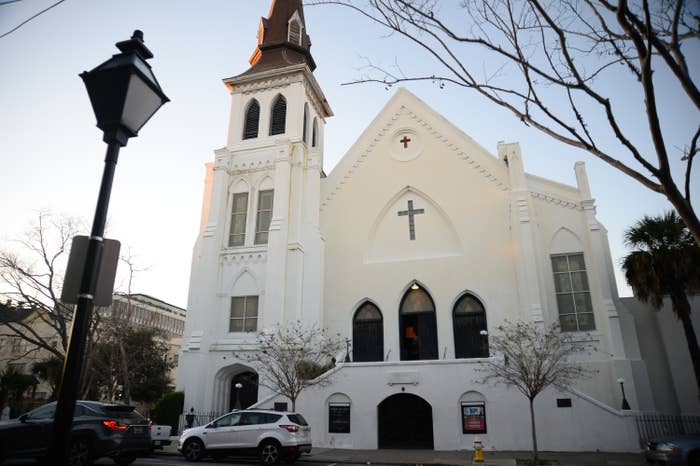
Survivors and families of the victims of the 2015 Charleston church shooting will receive $88 million in a settlement with the Department of Justice, closing out their lawsuits against the federal government over failures in the national background check system that allowed the shooter to purchase a gun.
Of the settlement, $25 million will be paid out to the survivors of the shooting, and $63 million will go to the families of the nine victims. Bakari Sellers, an attorney representing the families, announced the settlement at a press conference Thursday, calling it "one of the largest settlements of a collection of civil rights cases in this country's history."
The shooter, white supremacist Dylann Roof, killed nine people at Mother Emanuel AME Church in Charleston, South Carolina, in 2015. He had told friends that he wanted to start a "race war," and investigators found that he had made several visits to the historic Black church and asked about their worship times prior to the shooting. He was found guilty of all charges in December 2016 and sentenced to death.
The survivors and victims' families sued the federal government in 2016. In August last year, an appellate court overturned a lower court's ruling, allowing the lawsuits to go ahead.
"No amount of compensation will ever replace my father's life," Eliana Pinckney, the daughter of Clementa Pinckney, the church pastor who was killed in the shooting, said Thursday. "But through the help and the opportunities that the government and the people standing behind me have provided, it allows me and my sister to have the opportunity to make sure ... that my father's legacy doesn't go away."
Officials and family members of the victims thanked the Biden administration and officials with the Justice Department for their work in arranging the settlement.
"What the attorney general has done is that he's put an emphasis on civil rights," South Carolina state Sen. Gerald Malloy said. "Merrick Garland, without his passion, him carrying out the mission, then we would not be here — and his tremendous staff."
Several weeks after the shooting, James Comey, then the director of the FBI, revealed that there were missteps in the federal background check process that failed to prevent the shooter from buying the gun used.
The shooter had bought a semiautomatic pistol from a federally licensed dealer months before in a transaction that required the dealer to contact the National Instant Criminal Background Check System (NICS), which the FBI runs, to check if the shooter had any disqualifying convictions or drug history.
Due to the NICS representative's confusion about the geography of South Carolina, they did not immediately contact the correct police department, which led to Roof's purchase being marked as "pending." Dealers are allowed to process gun purchases after a period of time even if the NICS review is pending, and the dealer in West Columbia subsequently transferred the gun to him.
"We wish we could turn back time, because from this vantage point, everything seems obvious, but we can’t," Comey said at the time. "What we can do is make sure that we learn from it, get better, and work to ensure that we catch everything."
